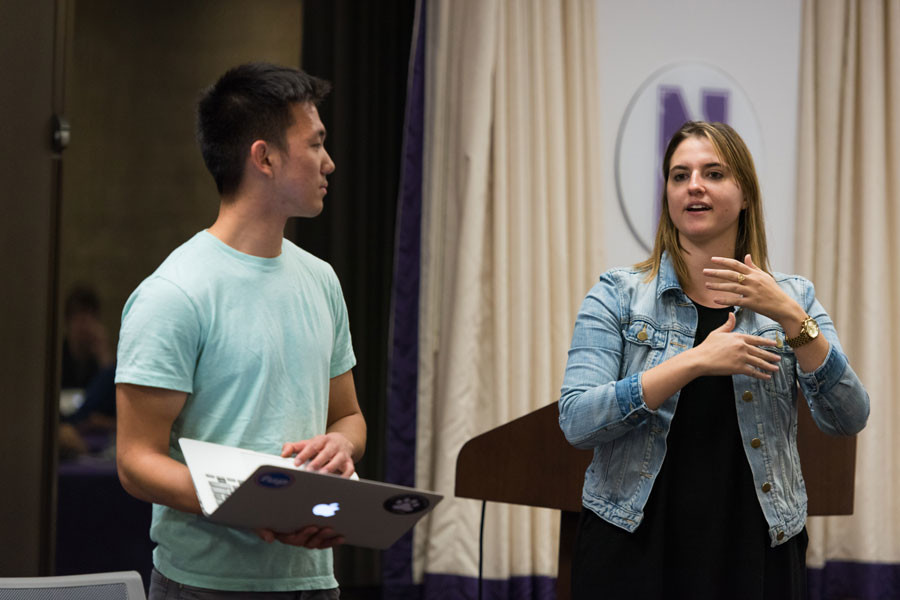Schneider, Mok explain funding to new ASG senators
Daniel Tian/Daily Senior Staffer
Weinberg seniors Kenny Mok and Mackenzie Schneider discuss Senate’s funding model at its meeting Wednesday. The body will hear fall A-status funding proposals at its meeting next week.
November 5, 2015
Associated Student Government Senate held a brief meeting Wednesday, preparing itself to hear Fall Quarter funding proposals during its next three meetings.
Weinberg seniors Mackenzie Schneider, ASG vice president for A-status finances, and Kenny Mok, ASG’s vice president for B-status finances, outlined the funding process for new and returning senators. Next Wednesday, Senate will hear fall’s A-status funding proposals as new business.
Each quarter, students pay a $58 student activity fee. That fee, collected three times per year, comprises ASG’s annual budget: roughly $1.4 million.
Student government uses almost all of that money to fund student groups — roughly $80,000 comprises ASG’s internal budget. ASG divides on-campus organizations into two categories: A-status groups and B-status groups.
Despite their differences, Schneider said both the A-status and B-status committees draw their original funding from students, prompting them to try to open events to as many students as possible.
“We try to make sure that all activities are accessible to all students,” she said, “and they’re comfortable with how their money is being spent.”
Just more than $1 million goes to A-status organizations, the 45 student groups that focus mostly on holding large events, Schneider said.
The range that groups receive in funding is vast: Together, A&O and Mayfest receive more than half of the entire A-status pool — about $540,000 between the two — while other groups receive less than $3,000 in annual funding.
Most other A-status organizations fall somewhere in between. College Feminists, for example, received $15,125 for this year to cover speakers and other costs.
“That’s the big difference,” Schneider said. “Groups that are A-status are more programming-oriented. … They put on big speaker events.”
Senate approved much of its A-status funding for this year in May.
Weinberg senior Matthew Clarkston, speaker of the Senate, said next week the body will hear fall A-status funding proposals as new business.
As for B-status organizations, roughly 100 groups receive just more than $17,000 total in funding.
Mok said those groups have smaller asks.
“A film group needs camera equipment,” Mok said. “A dance group needs drumsticks.”
The list of B-status groups is as long as it is diverse: A capella groups ask ASG to cover venue costs, social justice organizations ask for covers on speakers’ fees, and all want funding for the miscellaneous, niche budget items they need covered. Happiness Club, for example, received $100 for a “candy flashmob” and $10 for “small containers and sponges for Temporary Tattoo Day.”
Most funding decisions are made within committee and then rubber-stamped by Senate. Senate does, however, need to approve funding decisions, and it can also amend the committee’s decision.
During a funding hearing, a senator can move to add money to a group’s allocation. If a majority of senators approve, the group will receive additional funding from the committee’s “amendment pool,” a supplemental fund of money the committee sets aside for Senate’s changes.
Weinberg senior Noah Star, ASG’s president, said funding is one of the major ways student government works with the student body.
“It requires tough decisions, but I think that over time the funding (system) has evolved to be representative of what students want,” he said. “Kenny and Mackenzie have done an extremely good job of helping provide the diversity of programming this campus demands.”
Email: [email protected]
Twitter: @Shane_McKeon


